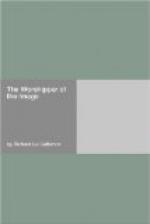“But I understand it all now,” he continued, “see it all. Do you remember saying that perhaps I had never loved anything but images all my life? It was quite true. Since I can remember, when I thought I loved something I was sure to find sooner or later that I loved less the object itself than what I could say about it, and when I had said something beautiful, something I could remember and say over and over to myself, I cared little if the object were removed. The spiritual essence of it seemed to have passed over into my words, and I loved the reincarnation best. Only at last have I awakened to realities, and the shadows flee away. The worshipper of the Image is dead within me. But alas! that little Wonder had to die first—”
“I used to tell myself,” he went on, “that human life, however exquisite, without art to eternalise it, was like a rose showering its petals upon the ground. For so brief a space the rose stood perfect, then fell in a ruin of perfume. Wonderful moments had human life, but without art were they not like pearls falling into a gulf? So I said: there is nothing real but art. The material of art passes—human love, human beauty—but art remains. It is the image, not the reality, that is everlasting. I will live in the image.”
“But I know now,” he once more resumed, “that there is a higher immortality than art’s,—the immortality of love. The immortality of art indeed is one of those curious illusions of man’s self-love which a moment’s thought dispels. Art, who need be told, is as dependent for its survival on the survival of its physical media as man’s body itself—and though the epic and the great canvas escape combustion for a million years, they must burn at last, burn with all the other accumulated shadows of time. What we call immortality in art is but the shadow of the soul’s immortality; but the immortality of love is that of the soul itself—”
“O Antony,” interrupted Beatrice, “you really believe that now? You will never doubt it again?”
“We never doubt what we have really seen, and I had never seen before,” answered Antony, taking her hand and looking deep into her eyes, “never seen it as I see it now.”
“And you will never doubt it again?”
“Never.”
“Whatever that voice should say to you?”
“I shall never hear that voice again.”
“O Antony, is it really true? You have come back to me. I can hardly believe it.”
“Listen, Beatrice; when we return to the Valley, return only to leave it for ever, I will take the Image and smash it in a hundred pieces—for I hate it now as much as I once loved it. Fear not; it will never trouble our peace again.”
The mention of the valley was a momentary cloud on Beatrice’s happiness, but as she looked into Antony’s resolute love-lit face, it melted away.
CHAPTER XX
ANTONY’S JUDGMENT UPON SILENCIEUX




